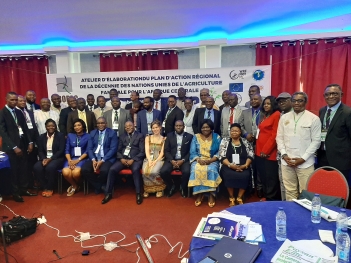The Global Action Plan for the Decade includes as key goal the development of at least 7 Sub regional, 5 Regional and 100 National Action Plans by 2024.
On 4 and 5 December 2019, about 40 representatives of regional and national organizations in Central Africa met in Douala, Cameroon, to work on the development of its Action Plan for the United Nations Decade of Family Farming 2019-2028 (UNDFF).
Representatives from the CEMAC (Central African Economic and Monetary Community), specialized regional institutions (PRASAC, COREP, CEBEVIRHA, COMIFAC), governments, civil society organizations, members of PROPAC, the FAO sub-regional office, the IFAD Regional office, ILC Africa and the World Rural Forum participated in this workshop organized jointly by PROPAC (Regional Platform of Central African Organizations) and ECCAS (Economic Community of Central African States).
The mobilization of these regional actors involved in family farming made it possible to initiate an inclusive dialogue in Central Africa on the UNDFF, while strengthening the capacities of government actors and civil society in this field.
The efforts made during the two days of work led to the elaboration of a draft Action Plan for Central Africa and its roadmap for implementation. A coordination committee, currently composed by ECCAS, CEMAC, FAO, IFAD, and PROPAC, will be in charge of the implementation of the roadmap, to drive the process agreed upon in Douala. This includes the final elaboration of the draft UNDFF Action Plan for Central Africa, which ECCAS and CEMAC will have to validate and adopt, if applicable.
In this way, this Action Plan will become a strategy to generate real improvements in the implementation of regional policies such as PRIASAN (Regional Programme for Agricultural Investment and Food and Nutritional Security) and the CAP (Common Agricultural Policy) of ECCAS and the SAC (Common Agricultural Strategy) of CEMAC. Efforts will also be made to encourage the Member States to also adopt National Action Plans, based on the recommendations made in the Action Plan for Central Africa.
The Regional Economic Communities (REC) and their technical and financial partners are committed to continuing their efforts to achieve these results within the framework of the UNDFF.
This workshop was supported by IFAD and ILC.
KEY PROPOSALS FOR THE PROMOTION OF YOUTH AND WOMEN IN FAMILY FARMING
Throughout the workshop, the participants formulated various proposals to improve public policies and regional and national programs for family farming, splitting them up pillar by pillar, following the structure of the UNDFF Global Action Plan.
Participants recommended, for example, better integration of family farming into agricultural policies and strategies at national and regional levels, through the establishment of a legal and regulatory framework for multi-stakeholder and multi-sectoral dialogue on specific family farming issues.
On youth, it was recommended, among others, the establishment of mechanisms to integrate young people into agricultural decision-making processes at different levels and to improve the technical platform of agricultural schools to improve the technical quality of training and to promote the capitalization of knowledge and the exchange of experiences through ICTs.
Proposals for rural women comprised the inclusion in national budgets of a special fund for the support of women to increase their access to credit, land, health, training and social security, and their participation in all land governance bodies.
KEY TARGET FOR 2024, 5 REGIONAL, 7 SUBREGIONAL AND 100 NATIONAL ACTION PLANS
The Global Action Plan for the Decade, an official document adopted by international organizations and governments within the framework of the UNDFF, commits to the creation and implementation of 5 Regional and 7 Sub-Regional Action Plans for the implementation of the Decade by 2024, prepared by governments in dialogue with family farming organizations and 100 National Action Plans, prepared by governments in dialogue with family farming organizations and/or National Committees of Family Farming, which are essential for bringing the Decade to the field and generating a positive impact.
The changes in these 10 years must take place at the global level, but also at the regional and national levels, which is where the greatest advocacy efforts will be made to improve the livelihoods of men and women family farmers.



